The Germanest Form of Music Ever
Deutschland über us

Meet Benjamin Appl. He’s a 35-year-old baritone with a jawline that I’d let slice me to bits and then thank for doing it — and the voice of an angel (provided that said angel had a very deep voice). His new album is taking the German classical music world by Sturm und Drang — which is pretty interesting, given its title, Heimat (HYME-at, or “homeland”) and its contents: Lieder (LEED-ur), a.k.a. ballads consisting of German poems by the likes of Schiller and Wilhelm Müller, set to music by composers such as Schubert.
Lieder last enjoyed widespread popularity when everyone involved with their composition, arrangement and performance wore a frock coat. And yet, here’s Appl looking like 9 million Euros in a sharp-ass suit, doing the “Erlkönig,” a creepy poem by Goethe set to Schubert:
Hold onto your Hintern, friends: According to this trend piece in Die Welt (dee VELT, or The World), the slightly creepy Deutschland-ode is back in a big way. Appl, the unfairly handsome Singer-Sarsgård is going to Lied us to the homeland, and we’re going to like it.
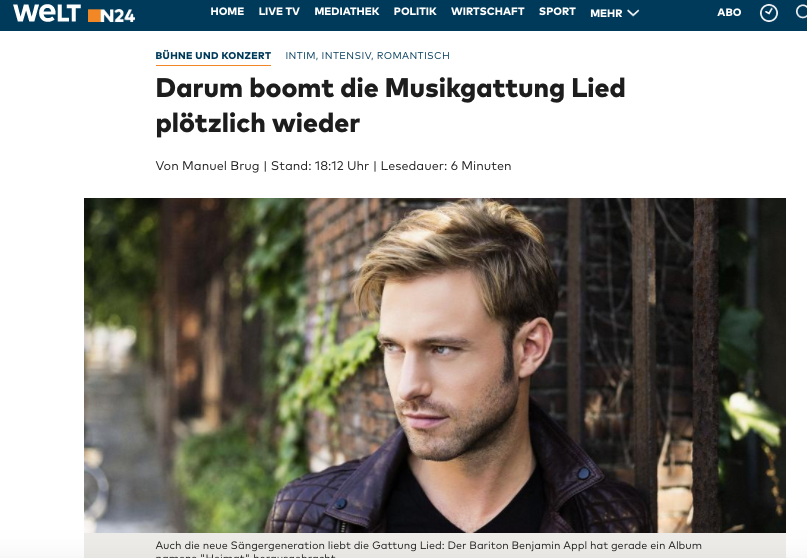
Die Welt is basically the German Wall Street Journal (also, they published a hit piece of sorts on me once! It’s the most famous I’ve ever been), so it’s unsurprising that author Manuel Brug described the modern unpopularity of the “Germanest form of music ever” without so much as alluding to the political and historical reasons for this unpopularity — reasons, as you’ll see, which are about as subtle as the piano on “Der Kampf.”
Brug does go out of his way to note the diversity of the audience at a recent Appl recital (“You’d be hard-pressed to find a more racially diverse, knowledgeable and enthusiastic group elsewhere in the German capital”), and the “electrifyingly contemporary, universally human” quality he brings to the pieces — but what he does not so much as mention is how jarring it is for the rest of the world (and much of Germany) to see an album of Lieder, un-ironically titled Heimat with a perfect-looking blonde dude on the cover. (Like, perfect-looking, all right?)
Because guess what? The Germanest Form of Music Ever — and that word, Heimat — come charged with 1.12 jigawatts of untoward connotations from Germany’s past, specifically its entanglements with national identity.
First of all, as much as Europeans like to pick on us for being a rebellious young dipshit country that is apparently in the midst of its insufferable college-sophomore Ayn Rand phase, Germans should be careful, because Germany wasn’t even a thing until 1871. 1871!
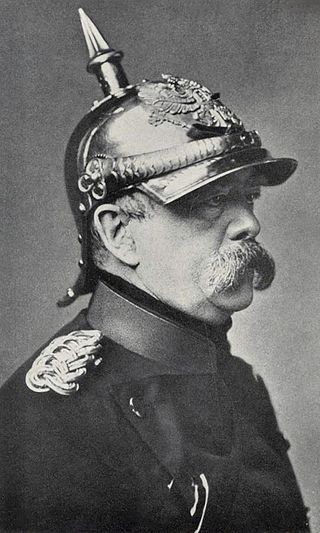
Fine, that’s an oversimplification, but really: The German Empire (or Second Reich, as we know it now), wasn’t formed until almost the twentieth damn century. The first Reich was the Holy Roman Empire for chrissakes, of which all the German-speaking lands were still a part until eighteen hundred and six, when, of course, this happened. (All through grad school people kept mistaking me for someone in the history department, and I can definitely see why.)
This meant that even though, say, Prussia and Saxony shared a common language (more or less), they were different territories, with tangles of Electors and Junkers (YOON-kahs) and other government randos that no real American should ever have to care about. This made for some most excellent literary fodder: Heinrich von Kleist’s gripping novella Michael Kohlhaas hinges on a bureaucratic misunderstanding between Saxony and Brandenburg, in which horses are harmed and then Saxony gets set on fire.

But, it also made for a not-so-excellent sense of what being “German” actually meant. And meanwhile, Germans were hella jealous of their neighbors in France who clearly had enough of a national identity to throw a spiffy revolution. Roundabout the end of the eighteenth century, enter the fixers of all things: THE POETS.
Goethe was like, You know what we need to feel like a unified culture? Our own Faustus. Boom.
And Schiller was like, You know what else we need? A bunch of poems with soaring imagery that everyone can identify with. Boom.
And then later, Schubert and Beethoven were like, We should set those poems to music and then everyone will know them by heart, because classical music concerts are the YouTube cat videos of our time. Boom.
So in a way, German national identity — and any remotely unified notion of the deutsche Heimat — was an artificially cultivated concept foisted upon an eager public by the arts. It took less than a century to ingrain that concept so mightily that it could be invoked to scapegoat and marginalize an entire religion.
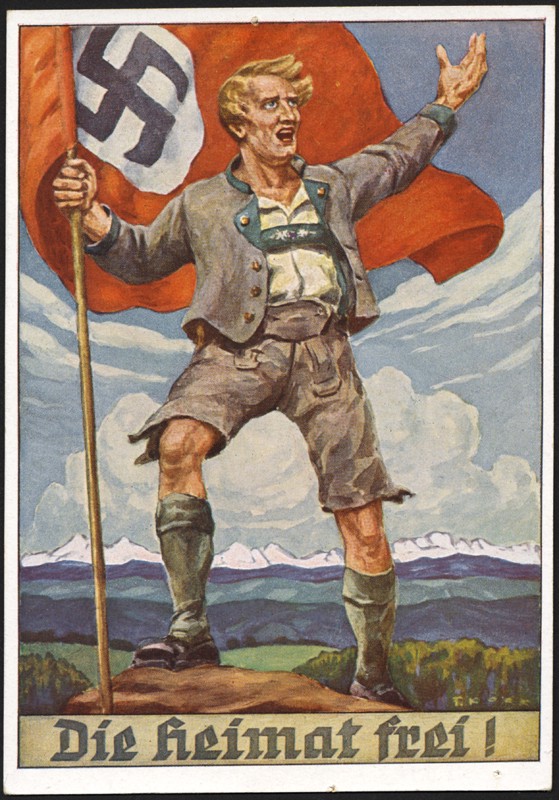
Yes, the reason the word Heimat is so charged today is thanks to the Third Reich and its propaganda, which included the simplistically plotted, Aryan-cast didactic films from the government-controlled UFA Studios, that ruled the deutsche Kino (KEY-no) during you-know-when.
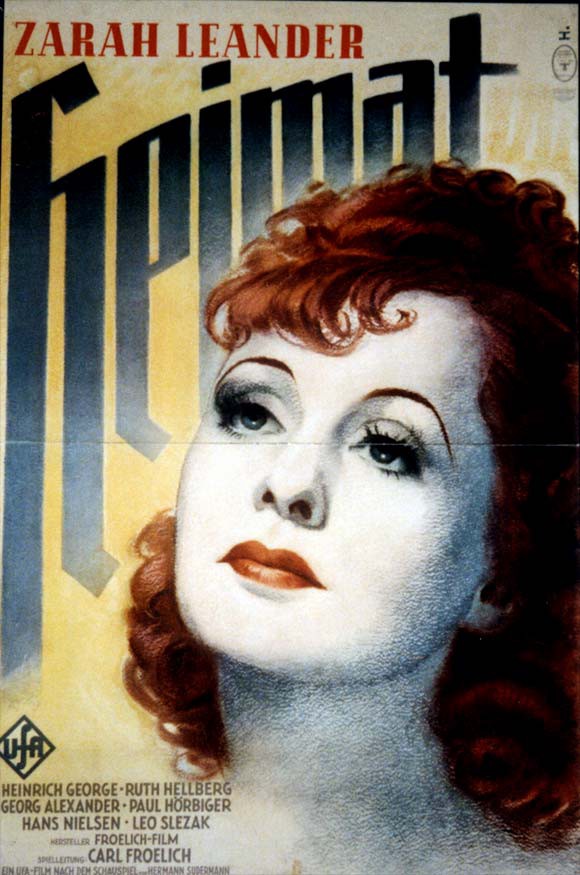
After the war, there was even a brief and bizarre nostalgia genre called the Heimatfilm in West Germany, one that avoided any association with the Nazi past by simply pretending that entire business didn’t exist. My personal favorite is 1959’s Und ewig singen die Wälder (oond EH-vig ZING-un dee WELD-ur), or “The Forests Sing Forever,” a deeply technicolored, very sweaty melodrama by Paul May that taps into German viewers’ omnipresent anxiety about the possibly forthcoming nuclear apocalypse by completely ignoring everything. Also, there’s a bear.
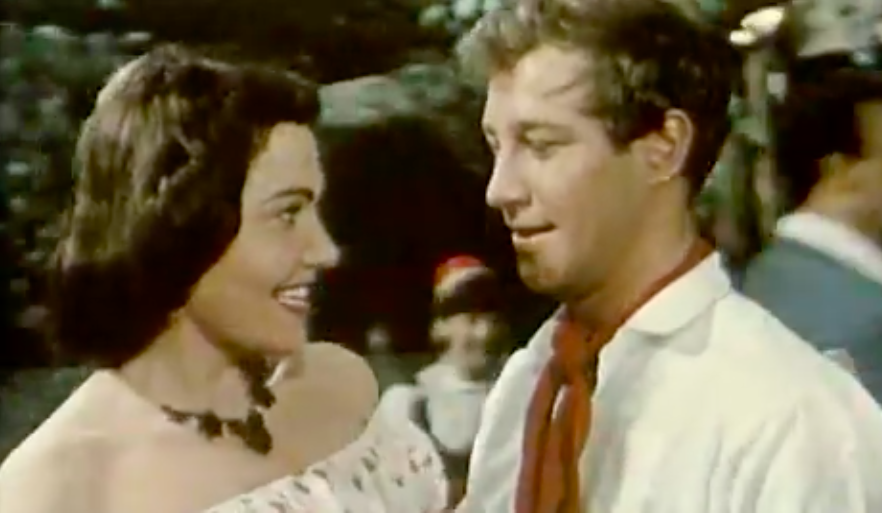
Still, “national dress” aside, invoking un-ironic nostalgia for the German homeland hasn’t otherwise been überfashionable since about 1944.
Until now, I guess! Welcome to an epoch of renewed anxiety about nuclear apocalypse, and also, coincidentally, rising tides of nationalism, and also, coincidentally, the resurrected very German national music style! Sure, the USA is now leading this particular charge and most of our national songs are by Toby Keith and not Schubert—but Germany’s AfD, at least (a political party that hates fer’ners but loves trains) seems all too happy to follow our Lied.
Do I really think Benjamin Appl and his perfect cheekbones are complicit participants in something sinister? Of course not — the man’s just singing in a genre that suits him, and good for him and his intoxicating blue eyes. It’s not Appl that concerns me — it’s the oblivious puff piece in Die Welt touting an album called Heimat, recorded in the Germanest Form of Music Ever, that it calls “universally human.” One can’t help but wonder: What humans will be universally included in the next empire?
